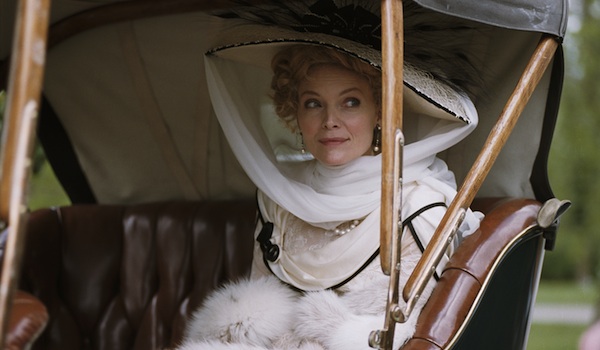Chéri Review
I remember first hearing about Cheri shortly after the Oscar ceremony in 2009. It was time for everyone’s year-in-advance predictions, and at the top of many Best Actress lists was Michelle Pfeiffer. And for good reason. She’s a well-respected actress who has never won an Oscar, and she was being directed in a period piece from the great Stephen Frears (you know, the guy who turned Helen Mirren into Queen Elizabeth). How can you go wrong? Let me count the ways.
Cheri has a serious problem with tone. It emphasizes style over substance. And the narrative is a mess. We are expected to care about these two star-crossed lovers, but the film skips over six years of their relationship in favor of focusing the film on the time they spend apart. How can we emotionally invest ourselves in a relationship that we hardly see? I was of the belief that Frears could do little wrong. Cheri challenged that hypothesis.
The film, which takes place in pre-World War I France, follows the lives of Lea (Pfeiffer), the richest and most beautiful prostitute in Europe, and Cheri (Rupert Friend), a playboy whose mother (Kathy Bates) is a former prostitute and rival of Lea’s. Cheri has known Lea since he was a child, but now that he has become a man, he begins to look at her in another way. His mother encourages it because she wants him to get it out of his system before taking a wife. So Lea and Cheri begin a six-year affair. The two get comfortable, but it’s too comfortable, for when Cheri’s mother arranges a marriage to the young, beautiful, and rich Edmee (Felicity Jones), it’s the end of the affair for Cheri and Lea, and neither one quite realizes what he or she will miss.
The biggest problem with Cheri is that Frears elects to skip over almost the entire affair of Cheri and Lea, but that’s not the only problem. The film is beautiful to look at, but almost completely hollow. For all the beautiful costumes and sets, there’s not even an inkling of real emotion. The tone shifts wildly from playful to deadly serious, touching on subjects as solemn as infidelity, aging, and sexism, often with an intended laugh (but usually an unfunny one). The tone problems aren’t helped by the pretty terrible score from Alexandre Desplat—usually a great composer—which never fits in with what’s going on in the film. And the ending—well, the less said about it the better. It’s the most egregious example of jarring tone.
The acting is a mixed bag. Pfeiffer is good. We understand why Cheri falls for her—she’s mostly a joy to be around. But she’s a bit of handful on some occasions, and she is rarely straightforward about her wants and desires, making her difficult to read. Rupert Friend, who struggled through another recent period piece, The Young Victoria, is worse in this film. He doesn’t have any of the charisma of a playboy, and it’s hard for us to understand why someone as fun and exciting as Lea would fall for him. Kathy Bates is good for a few of the laughs, while Felicity Jones gives us a one-dimensional character, but one whom we feel sorry for. Hers isn’t a great performance, but it’s solid.
The film came and went in the summer of 2009. Not a peep was heard about it on Oscar night—no Pfeiffer, no art direction, no costumes (surprisingly). That’s probably because the film just isn’t very good. Frears is capable of so much better. Tamara Drewe is reportedly a step in the right direction. But it’s hard for a filmmaker this skilled to do worse than Cheri. It starts nowhere, goes nowhere, and ends with a whimper.
















